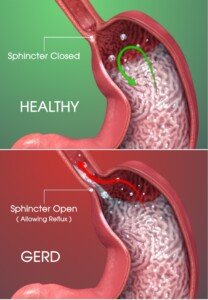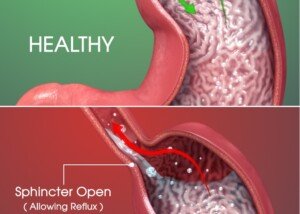Lexapro can trigger GERD, but just how does this happen?
Lexapro is an antidepressant drug, but it can also help reduce anxiety.
It belongs to a class of drugs called selective serotonin reuptake inhibitors (SSRIs).
Among the possible side effects to taking Lexapro is that of gastroesophageal reflux disease.
How Lexapro Leads to GERD
“Lexapro and other antidepressants can relax the lower esophageal sphincter and promote heartburn,” explains Larry Good, MD, a gastroenterologist who’s been in practice for 40+ years; has a private practice in Lynbrook, NY; and is affiliated with Concierge Choice Physicians, a leading provider of personalized care in the U.S.
Dr. Good continues, “Many medications can have similar effects, and doctors should take a very careful medication history when evaluating patients with heartburn.”
Since Lexapro can relax the lower esophageal sphincter, there is something that you can do to help manage the acid reflux — at least overnight.

Scientific Animations, CC/BY-SA/Attribution-ShareAlike 4.0 International
Relief for Acid Reflux from Lexapro
When you’re lying in your bed, with your body horizontal, the sphincter becomes more relaxed.
Gravity’s vertical effect is not present to help keep the stomach’s acidic juices contained where they belong: in the stomach.
So while you’re asleep, the acid refluxes upward, getting past that weakened sphincter, and makes its way up the esophagus.
It may even reach the throat, causing throat related symptoms when you awaken: a bitter or unpleasant taste in your mouth; a cough; a scratchy throat; a hoarse voice.
Drinking water won’t help because the problem is that your vocal cords have been contacted by acid reflux.
The water will go down the esophagus, not having any effect on the vocal cords.
What you can do is prop your torso up a bit to bring some gravity into the equation.
Do not eat within three hours of bedtime, since eating close to bedtime can contribute to overnight acid reflux.
For daytime management, avoid foods that give you heartburn, and avoid eating a lot of food at one sitting.
If the GERD from Lexapro cannot be managed with these natural approaches, do not quit taking this antidepressant unless your doctor gives you instructions to do so.
Your doctor may also prescribe a drug to help control the acid reflux.
 Dr. Good has additional expertise in the diagnosis/treatment of IBS and inflammatory bowel disease, and is extremely proactive in genetic testing, individualization of pharmacologic treatment, and risk mitigation in cancer screening/prevention. Concierge Choice Physicians
Dr. Good has additional expertise in the diagnosis/treatment of IBS and inflammatory bowel disease, and is extremely proactive in genetic testing, individualization of pharmacologic treatment, and risk mitigation in cancer screening/prevention. Concierge Choice Physicians
 Lorra Garrick has been covering medical, fitness and cybersecurity topics for many years, having written thousands of articles for print magazines and websites, including as a ghostwriter. She’s also a former ACE-certified personal trainer.
Lorra Garrick has been covering medical, fitness and cybersecurity topics for many years, having written thousands of articles for print magazines and websites, including as a ghostwriter. She’s also a former ACE-certified personal trainer.
.










































